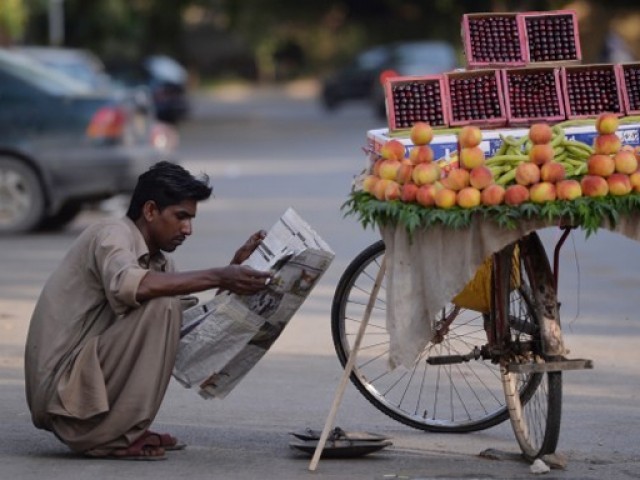
Hassan works as a hawker to earn a livelihood, moving from bus to bus, making his way through the narrow aisles of public transport vehicles and carrying his merchandise on his shoulders. It is a daily struggle for him as he leaves his home, usually wearing a loose t-shirt that hangs over his lanky frame, at around 11am. It is the beginning of a long day for him but no matter how tired he may be, Hassan knows he cannot afford to miss out on work or he would lose an entire day’s earnings - especially now, when inflation has adversely affected his business as it has that of other hawkers.
Talking about his predicament, Hassan said, “Now, making a profit of two to three rupees on a single item seems a challenging task” when in the past one would easily make a profit of more than 100% on a single product.
However, despite the immense hard work and struggle that entails working as a hawker, Hassan opted for it 18 years back and he continues to stick to his choice.
Sindh govt mulls over another solution to end garbage menace
How it all began?
Coming from a humble background, Hassan began his search for employment and earning opportunities at a very young age. He had dropped out of school after completing sixth grade and hence, chances of him getting a good enough job were near to impossible.
He refrained from asking for help and somehow managed to land himself a job as a salesman at a garment shop in Saddar, which he left soon. At the young age of 20, he had other dreams and wanted to set up his own business, even if on a small scale. He preferred working for himself rather than anybody else.
He had limited resources, no education and zero opportunities. But he had ambition and courage. It was the best of times and it was the worst of times for him, right before he started working as a hawker, initially selling battery cells imported from China.
The industry was flourishing back then, as first battery cells and later other products from China made their way to Pakistani markets, being sold at extremely low rates.
As Hassan recalls, “At that time, a battery that cost him four rupees was sold between eight rupees and Rs10, which meant a profit of more than 100%.”
As his business thrived, he was able to save enough money to buy himself a house in Federal B Area, where he still lives with his wife.
Hard times
However, things are not the same anymore, said Hassan, adding that rising inflation and unemployment have badly affected his business.
“Now I have to make sure that my sale adds up to at least Rs1,400 to make a profit of Rs400,” he said.
As many as 40 to 50 types of items constitute his small portable shop. Hanging on an black rod, these are mostly imported yet inexpensive items of daily use including needles, cotton buds, machines for threading needles, mobile phone covers, key chains, ring holders for mobile phones, safety pins, laser lights and torches.
“The cost of imported products has risen sharply as the rupee has devalued and sales have reduced,” lamented Hassan. Also, the customers, who mostly belong to lower-income background, now opt to buy items that cost less, he said, adding that buying power of people has reduced due to increase in the price of food items and transport fares.
Consequently, many of the hawkers have changed businesses, reflected Hassan. “The number of hawkers who used to sell merchandise to bus passengers [in Karachi] has reduced by about 90%,”he said. Elaborating further, he said that most such hawkers has come to Karachi from other cities in search of employment opportunities and amid declining sales were left with little option to opt for other means of earning livelihood.
Alternative professions
In the face of dwindling business, Hassan too, has been lately considering the possibility of saving money and buying a rickshaw. Moreover, he has also started working as a delivery man. Delivering about 10 to 12 cakes per month, he is able to earn an additional Rs150 to Rs200 per order.
Nevertheless, his main source of earning continues to be selling merchandise on buses.
Karachi mayor demands grants for KMC hospitals
Daily struggle
He visits Bolton Market every week, in search of items that he can buy in bulk and later sell to earn good money. He looks for items that are cheap and yet useful for people.
Working from dusk to dawn, he changes more than 100 buses every day and returns home at around midnight.
“It is important that I earn money on a daily basis to run the household and support my family,” he said.
However, he is not able make any sales “on days when CNG is unavailable and buses stop operating.” At times, he is also intercepted by bus conductors who don’t let him get on the bus. And yet, Hassan is somehow managing to remain resolute in the face of increasing difficulties, until he finds another opportunity to earn his livelihood.

















COMMENTS
Comments are moderated and generally will be posted if they are on-topic and not abusive.
For more information, please see our Comments FAQ